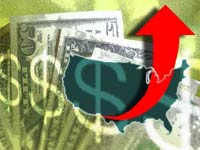US economy to grow at a moderate pace
Surging gasoline prices pushed inflation higher last month, the Labor Department reported yesterday, with the increases eating up workers' pay gains.

But other government data showed that, outside of fuel costs, prices did not rise much in March, while home construction appeared to stabilize and factories stepped up production.
The figures, combined with other economic data released recently, depict a U.S. economy that is holding up despite a slump in housing, several analysts said yesterday.
"We ended the quarter with the economy steadying itself and not spiraling down into a recession," said Stuart G. Hoffman, chief economist at PNC Financial Services. He estimated that the economy was growing at a moderate annual pace, 2 to 2.5 percent. "This is not an economy that is regaining momentum . . . nor is it losing momentum," he said.
Wall Street appeared to share that assessment. The Dow Jones industrial average and Standard & Poor's 500-stock index closed up modestly.
Consumers had reason to be grumpier. The Labor Department's consumer price index, a widely followed inflation measure, rose a seasonally adjusted 0.6 percent last month, the biggest increase since a similar jump in April last year. The index was 2.8 percent higher than a year earlier.
The March increase primarily reflected a 5.9 percent rise in fuel prices, including a 10.6 percent jump at gasoline pumps, the Washington Post reports.
U.S. consumer prices eased in March and housing starts unexpectedly rose, suggesting the economy will grow at a moderate pace with contained inflation.
The 0.1 percent increase in core consumer prices, which exclude food and energy costs, was the smallest in three months and follows a 0.2 percent February gain, the Labor Department said today in Washington. Builders broke ground on new homes at an annual rate of 1.518 million, up 0.8 percent from the prior month, the Commerce Department reported.
The inflation figures mean Federal Reserve Chairman Ben S. Bernanke may keep interest rates unchanged even as he predicts the economic expansion, currently in its sixth year, will pick up. Treasury notes rallied after the price report and held their gains after the Fed said industrial production fell.
"This is a big relief for the Fed," said Nigel Gault, chief U.S. economist at Global Insight Inc. in Lexington, Massachusetts. "It's one good month, and the Fed is going to have to see more good numbers before it can relax, but it comes after a few months where inflation was rising."
Investors pushed yields on Treasury notes lower. The yield on the benchmark 10-year note fell to 4.68 percent as of 5:12 p.m. in New York from 4.74 percent last yesterday.
The dollar fell against the euro, yen and British pound. Earlier today, the pound leapt to $2 for the first time in 15 years after a report showed U.K. inflation quickened to a decade high, spurring speculation the Bank of England will lift borrowing costs.
Including food and energy, U.S. consumer prices rose 0.6 percent, higher than February's 0.4 percent gain, Bloomberg reports.
Source: agencies
Prepared by Alexander Timoshik
Pravda.ru
Subscribe to Pravda.Ru Telegram channel, Facebook, RSS!




